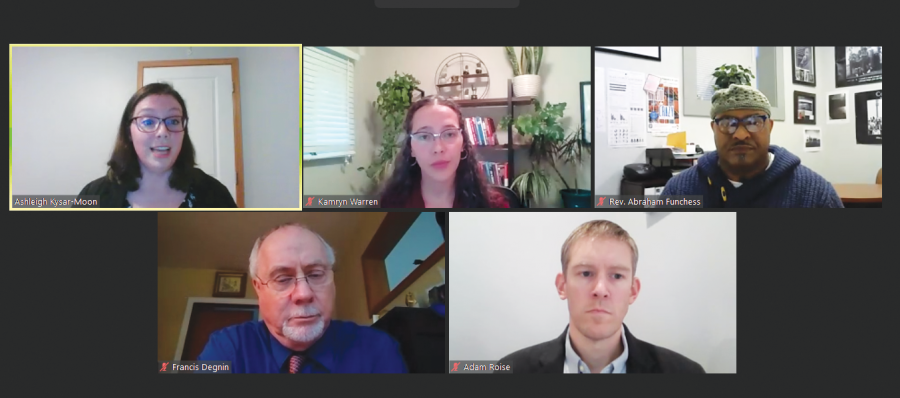Virtual Diversity Colloquium discusses health inequalities
This was the second academic discussion the Department of Sociology, Anthropology and Criminology has hosted this semester.
Apr 19, 2021
Four local healthcare and human rights experts gathered in a Zoom virtual conference call on the evening of Thursday, April 15 for an academic seminar about health inequalities in the age of COVID-19.
The event was part of the Department of Sociology, Anthropology and Criminology’s Diversity Colloquium series established in 2016, sponsored by the department and the College of Social and Behavioral Sciences.
Thursday’s event brought together panelists from across the UNI and Cedar Valley communities to discuss their research and professional experiences related to health inequalities and the COVID-19 pandemic. The panelists taking part in the colloquium — Dr. Adam Froyum Roise, physician and member of the Black Hawk County Board of Health; Rev. Abraham Funchess of the Waterloo Human Rights Commission; Francis Degnin, medical ethicist and professor of philosophy; and Ashleigh Kysar-Moon, assistant professor of sociology — represented a healthy selection of specialists from across the Cedar Valley.
Adopting a question-and-answer structure moderated by assistant professor of sociology Kamryn Warren, panelists touched on a wide array of topics related to both healthcare and societal inequalities in the United States and specifically the Cedar Valley.
Kysar-Moon spoke on a theme permeating across the ninety-minute discussion.
“I will just echo again what Dr. Degnin said: it is not that the pathogen is targeting racial and ethnic minority groups, but it is because of the long-standing inequalities in the social determinants of health leading to poor COVID-related outcomes,” she said.
On the subject of vaccines and public sentiment towards them, Funchess shared his insight and experiences drawn from the communities of which he is a part.
“The risk factors associated with being in some of our communities — diabetes, asthma, cancer and all these other underlying known clinical risks — absolutely frightens some of the people I have talked to,” he said.
As the panel drew to a close, Roise articulated some of the lessons he has learned during the COVID-19 pandemic, specifically in relation to improvements in healthcare science.
“As we know that there are inequalities in our system, I think unless we are really cognizant about how these inequalities are going to affect the new technology, we are just going to duplicate and replicate inequalities going forward,” he said. “I think we cannot forget about this as we develop new technologies.”
This particular colloquium marked the second academic discussion hosted this spring semester by the Department of Sociology, Anthropology and Criminology, and the third Diversity Colloquium of the academic year. The previous panels this academic year included topics such as Race, Social Justice and Policing in October of 2020 and Barriers to Family Prison Visitation, which took place in February.
More information related to both past and future Diversity Colloquium series can be found at csbs.uni.edu/sac/diversity-colloquium-series.








